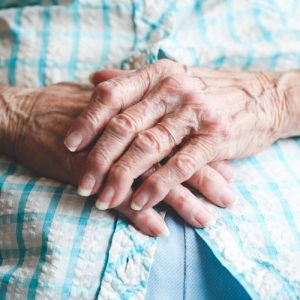
There are many contributing factors to arthritis including overuse, trauma to the joint, inflammation, or age-related changes in the collagen repair system.
Osteoarthritis
Osteoarthritis usually afflicts older adults due to “wear and tear” on the joints. It occurs when the cartilage cushion in a joint loses minerals due to a decline in the level of glucosamine. This leads to stiffness and the development of bone spurs as the body tries to stabilize the joints.
SIGNS AND SYMPTOMS OF OSTEOARTHRITIS
* Stiffness (especially in the morning)
* Painful and/or limited motion
* No signs of inflammation
* Occasionally only hands or knees affected
* Rarely are all joints affected at once
Rheumatoid Arthritis
Rheumatoid arthritis is a chronic inflammatory condition that may affect the whole body, but typically affects hands, wrists, feet, ankles, and knees, and may also include hips and shoulders. The immune system is generating antibodies that are affecting the joints, causing a constant state of inflammation. Rheumatoid arthritis is not considered to be a product of aging and is often observed to be hereditary.
SIGNS AND SYMPTOMS OF RHEUMATOID ARTHRITIS:
* Joint may be warm, tender, and/or swollen with almost constant pain and stiffness
* Joint deformities may become evident
Patients with rheumatoid arthritis have been shown to have leaky gut and food allergies. Any food can be problematic, and it is best to consult a naturopathic doctor for more information and/or testing. Medications for rheumatoid arthritis deplete the following vitamins and minerals: calcium, magnesium, potassium, selenium, zinc, folic acid, vitamins A, B6, C, and D. Our naturopathic doctors will counsel you on appropriate supplementation to replenish these to help maintain your health.
What Causes Arthritis?
In the case of osteoarthritis, the cause is just considered to be age-related wear and tear on your joints. However, diet, lifestyle, and stress influence inflammation in your body, which then affects your joints. Your hormones also affect your joints and inflammation. The loss of estrogen at menopause creates more inflammation in your joints. Supporting healthy levels of post-menopause estrogen helps. Certain foods also create more inflammation in your joints and contribute to the symptoms of arthritis. Structural issues like muscle imbalances or spinal or joint misalignment also add to arthritis symptoms. Naturopathic doctor Pamela Frank will identify factors like diet, lifestyle, food sensitivities, and nutrient deficiencies that may contribute to your arthritis.
Benefits of Our Naturopathic Arthritis Treatment
- Corrects your body chemistry in order to slow down and/or reverse the disease process
- Addresses the underlying root cause of your arthritis
- Will not merely mask your symptoms while you damage your joints further, but rather bring healing and correction of your body’s imbalances
- Assesses and monitors the level of your pain and deterioration
- Your treatment options help reverse the disease process as well as manage pain
- Eliminates toxins and rebuilds your vitality in order to speed healing and repair
Authored by Naturopath Dr. Pamela Frank
Arthritis and Natural Medicine Research
Telomere Length:
Cells from the knee joint of osteoarthritis patients were found to have abnormally short telomeres. Source: Complementary Prescriptions Journal, Vol.26, Issue 12, Dec. 2012
Ginger:
Daily supplementation with Zingiber Officinalis extract (ginger) was found to reduce pain in patients with osteoarthritis of the knee or hip. Source: J Altern Complement Med. 2012 Jun; 18(6):583-8.
Omega-3s:
The EPA fraction has been found to help stop the destruction of osteoarthritis-affected joints. Source: Pol Merkur Lekarski. 2012 May;32(191):329-34.
Rheumatoid arthritis patients supplementing with omega-3 polyunsaturated fatty acids were found to see improvements in the tender joint count, swollen joint count, morning stiffness, and physical function. Source: Arch Med Res, 2012 July; 43(5): 356-62.
Rheumatoid arthritis patients given high dose fish oil supplementation were found to have significantly lower rates of failure of disease-modifying anti-rheumatic drug therapy. Source: Ann Rheum Dis, 2013 Sept 30;
Supplementation with fish oil added to treatment with paracetamol was found to be beneficial to patients with rheumatoid arthritis. Source: Complement Ther Med, 2010 June-August; 18(3-4): 171-174
Vitamin D:
Rheumatoid arthritis patients with low plasma vitamin D levels were found to have over 5 times higher risk of disease activity. Source: Nutrients. 2013 Jun 26; 5(7):2268-75.
Maintaining normal serum vitamin D levels in rheumatoid arthritis patients was found to protect against interleukin 17-mediated inflammation and vascular dysfunction. Source: J Rheumatol, 2013 Jul 1; [Epub ahead of print].
The recommended intake of 800 IU/day of vitamin D may be ineffective in normalizing D levels of more disabled rheumatoid arthritis patients. Source: Clin Exp Rheumatol, 2012 Jul 4.
Vitamin D supplementation may slow the progression of osteoarthritis. Additional research is needed. Source: Rheumatology (Oxford), 2012 March 29
Vitamin B6:
A large dose of vitamin B6 daily was found to suppress pro-inflammatory cytokines in patients with rheumatoid arthritis. Source: Eur J Clin Nutr, 2010 Jun 23; [Epub ahead of print].
Acupuncture:
Treatment with acupuncture or electroacupuncture can benefit patients with rheumatoid arthritis. Source: Chin J Integr Med, 2011 July; 17(7): 505-9.